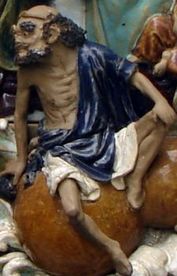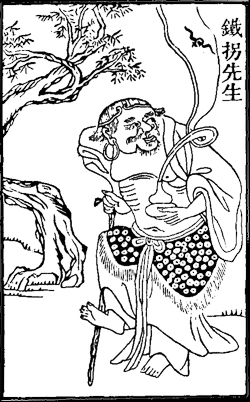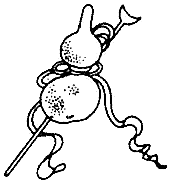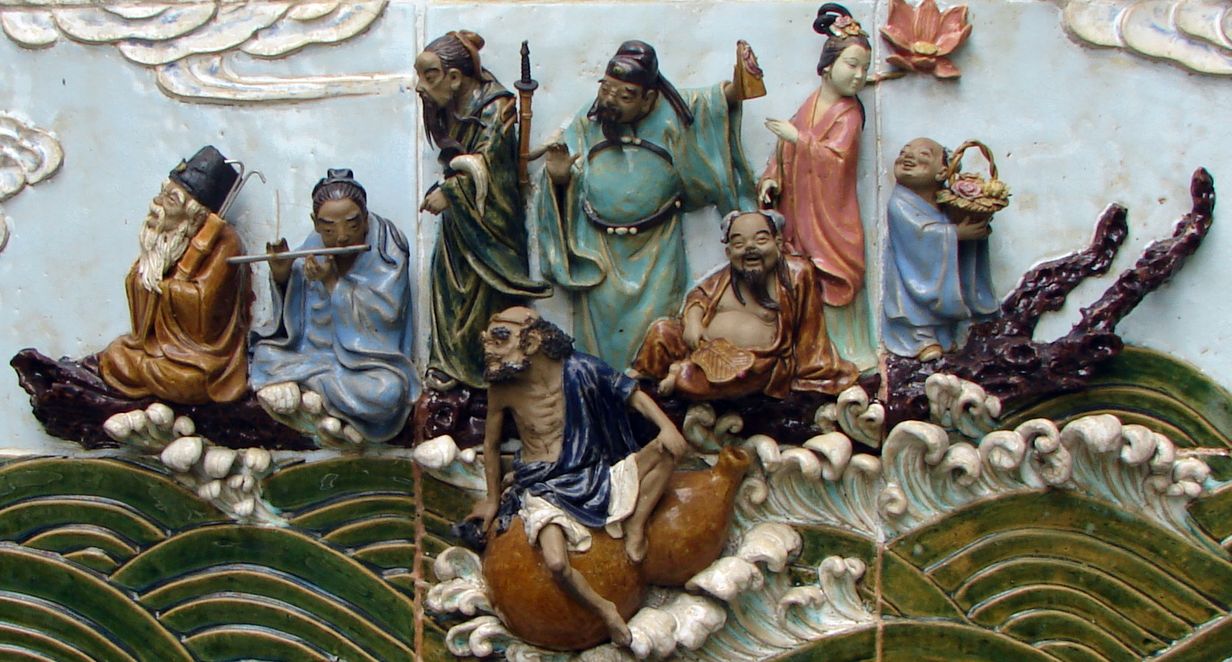
Content created: 2010-12-30
File last modified:
Go to previous or next story.

LǏ Xuán 李玄 = a handsome scholar seeking the Way, originally named LǏ Níngyáng 李凝阳, destined to be known to the world as LǏ Tiěguǎi 李铁拐
CÁO Dù 曹杜 = a timorous seeker
YÁNG Zǐ 杨子 = a disciple
LÁNG Lìng 郎令 = another one, virtually interchangeable with the first
The Queen Mother of the West (Xī Wángmǔ 西王母) = a formidable Daoist deity (a sort of mother superior to supernatural beings)
A dying mother & a dead beggar

Once upon a time —in the Táng 唐 dynasty (period 12) to be specific— there lived a man named Lǐ Níngyáng 李凝阳, who preferred to be called Lǐ Xuán 李玄, which meant “Lǐ the Mysterious.” He studied the Way in the Zhōngnán Mountains 中南山. He was handsome and strong, with a dignified and commanding presence. His accomplishments were a great many, and even today artists show him carrying a gourd filled with amazing pills that can cure human ills of every kind. (His generosity is such that some artists represent the gourd as so large that he sits on it rather than carrying it.)
Naturally as a handsome hermit of such accomplishment he came to the attention of the gods and immortals, who saw that he had great promise to learn ever more, and eventually to join the number of the immortals.
Some people say that the Queen Mother of the West (Xī Wángmǔ 西王母) herself instructed him in the mysteries of the Way.
Others say that he was instructed by none other than Lǎozǐ 老子 himself, who descended from his abode in the heavens to teach him. Eventually his spirit was able to leave his body and soar into the heavens on the back of a white crane and return again to his body at the hermitage. If you want to know how Lǎozǐ or the Queen Mother of the West came to be concerned about him, or what he was like before he became a powerful and mysterious Daoist adept, you will need to read the prequel to this story.
The more accomplished he became, the more his fame spread also among ordinary people, and young men came asking to be his disciples, although few proved worthy enough.
For example, among those who sought him out was a watchman named Cáo Dù 曹杜, who claimed he would follow Lǐ faithfully anywhere. To test him, Lǐ walked into a great furnace and told Cáo to follow him. But Cáo was much too afraid, not afraid of being burnt, he hastened to explain, but afraid that such a trick might constitute some kind of wicked sorcery or a contract with evil spirits and not virtuous mastery of the Way.
Skeptical, Lǐ Xuán cast a leaf upon the river and told him to step on it, and assured him that it would become a boat and bear him across the water. But again Cáo hesitated, not because he was afraid of drowning, he clarified, but lest this be some kind of wickedness unworthy of a true student of the Way. And he explained that as a watchman he knew all too well about wickedness. At that, Lǐ Xuán stepped onto the leaf himself and vanished, leaving the watchman by himself on the riverbank, too worried ever to find the Way.
Indeed the only disciples that we know he accepted were two promising young men of great virtue named Yáng Rén 杨仁 (or Yáng Zǐ 杨子) and Láng Lìng 郎令. The story below concerns only one of them, but people do not agree which one, and a few people even think they were two names for the same person. Let us assume it was Láng Lìng.
One day Lǐ Xuán was summoned by his teacher Lǎozǐ to leave his beautiful body and travel in spirit to visit him on Mount Huá 华山, some say to accompany him on a visit to the Western Regions. The adventure was to take a full week, which is rather a long time to leave a body without a spirit in it. So Lǐ Xuán told Láng Lìng to take special care of the magnificent body, and not to allow it to be taken over by any wandering ghosts in the course of the week.
“If anything goes wrong, and I do not return by the seventh day,” he said, “the body will become useless, and you can cremate it. Until then, simply stand guard over it.” Láng Lìng agreed to do so, and the master’s spirit left his body and flew away to Lǎozǐ’s realm.

The days passed, and the body began to deteriorate, although Láng Lìng guessed that the master would be able to repair it on his return. Or at least he hoped so. He spent night and day keeping an eye on it so that no evil spirit might come to take possession of it.
On the sixth day, however, a messenger came from his home with the terrible news that his mother was sick, very sick, indeed sick unto death. The messenger urged him to return home immediately to see her before she died, perhaps even to use any Daoist arts he might have learned to save her life.
Láng Lìng was distraught. How could he leave the body of his master, which he had promised to watch over? But how could he not return to his dying mother immediately?
Overcome by this unhappy conflict, he was finally persuaded by the messenger that the master’s body, which had been dead for six days now, and which looked terrible and smelled worse, surely had no hope of coming back to life. It made far more sense to cremate it in a dignified ceremony, and then try to save his mother, or at least to say goodbye to her before she passed on.
This was wise advice, of course, and Láng Lìng followed it, giving his master the best funeral he could, and then lighting the pyre and heading home with the messenger. Sadly, he arrived to learn that his mother had just died while he was busy with his master’s funeral. He spent the night sobbing, both because he had lost his mother and because he had failed to carry out fully the instruction of his master.
The next day, Lǐ Xuán returned from his visit with Lǎozǐ, but found that both his body and his disciple were missing. Eventually he found the smoldering funeral pyre and the uninhabitable ashes of the fine, handsome body he had left behind.
Desperate, he sought for another body to live in. The only one available was that of a beggar who had just starved to death not far away. As a Daoist magician, Lǐ was able to live without much food, so a starving body was fine. But quite aside from that, the thing was a mess: It was ugly and scarred, with a large, slightly pointed and very bald head and huge, sunken eyes. Its skin was scabrous with disease. Its clothes were tattered and grimy. And it was missing part of one leg.
But it was the only body available, so he had to make do with it, at least for the time being. He was accustomed to being strong and dazzlingly handsome, and he hoped he could get the Queen Mother of the West or Lǎozǐ to find him a better one.
(Some people say that he did in fact find a beautiful body, but it was female and in a moment of gallantry, he surrendered it to a female spirit who was also in need of a body, and that is why he was left with only the beggar.)
Neither Lǎozǐ nor the Queen Mother of the West was very sympathetic to his plight, for appearances are only appearances, and any Daoist knows they don’t really matter (except when they do). They probably even reminded him of the uncomforting old proverb often used by matchmakers to marry off really ugly people: “A person cannot be known by his looks any more than the sea can be measured with a jug” (fánrén bù kě màoxiàng, hǎishuǐ bù kě dǒuliáng 凡人不可貌相,海水不可斗量).
Instead of finding him a handsome new body, Lǎozǐ and the Queen Mother of the West presented him with an iron crutch, patched up the worst of the ulcers on his battered leg, and told him to go into the world with his gourd of elixirs and heal sick and ailing people, now that he was in a position to understand their great distress. So this became his mission. Since he had formerly been a person of great strength and extreme good looks, it was not really very nice being called “Lǐ of the Eyes Like Holes” (Lǐ Kǒngmù 李孔目), of course, or “Lǐ of the Iron Crutch” (Lǐ Tiěguǎi 李铁拐), although that is what most people still call him today. Most people don't even know his proper name is Xuán. (Well, all right, Níngyáng.)
His first step, in any case, was to find out why his no-good disciple Láng Lìng had burned his body and caused him all this misery. When Lǐ of the Iron Crutch found the lad, Láng had no idea that the hideous beggar approaching him was his old master, but in fact he wasn’t really paying much attention, since he was filled with his own misery and was in the process of hanging himself in painful shame over having failed both in the filial piety he owed to his mother and in the obedience he owed to his old master.
Moved by the boy’s grief, Lǐ Xuán, or rather Lǐ of the Iron Crutch, opened his magic gourd and gave Láng Lìng one of the pills it contained and told him how to bring his mother back to life.
Láng was, of course, much too smart to accept elixirs from strangers,
 but when Lǐ recounted what had happened, and how he had been forced to dwell in a grotesque body he did not choose, and when he pointed out that Láng’s mother was already dead anyway so that an elixir that failed to revive her at least couldn't kill her, the distraught disciple tried it out.
but when Lǐ recounted what had happened, and how he had been forced to dwell in a grotesque body he did not choose, and when he pointed out that Láng’s mother was already dead anyway so that an elixir that failed to revive her at least couldn't kill her, the distraught disciple tried it out.
And lo! not only did she return to life, but she and Láng Lìng lived another two hundred years, after which Láng Lìng himself also became an immortal and ascended into paradise. (Unless, as some say, it was the other disciple, Yáng Zǐ, who did so.)
Artists represent Lǐ of the Iron Crutch with his crutch, of course. But he is nearly always also carrying his gourd full of magical healing, which sometimes also serves as a boat. He is never outwardly beautiful, but a truly great artist can at least hint at his inner beauty.

Return to top
Go to
previous or next story,